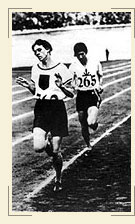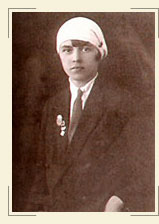|
 The
contestation of... Lina Radke
The
contestation of... Lina Radke
The
victory of an athlete is something that is often contested
in big sports organizations. In all cases this contestation
is  focused
on one person, it concerns the effort of a particular athlete.
The case of Lina Radke-Batschauer, however, is quite different.
Nobody called into question her victory in the Olympic Games
of 1928, but her participation, as well as the participation
of all women, in middle-distance and long-distance races.
What gave rise to this was the exhaustion of most female athletes,
who had taken part in the 800m final, which together with
five more track events were then included for the first time
in the Olympic Games. Lina Radke was the winner of the event
and she even broke the world record. She was the first woman
- and the last one for 32 years - to be an Olympic winner
in the 800m. The 800m women's track event was not included
in the following Olympic Games, nor was any other middle and
long-distance race. This exclusion had lasted until the Games
of Rome in 1960. focused
on one person, it concerns the effort of a particular athlete.
The case of Lina Radke-Batschauer, however, is quite different.
Nobody called into question her victory in the Olympic Games
of 1928, but her participation, as well as the participation
of all women, in middle-distance and long-distance races.
What gave rise to this was the exhaustion of most female athletes,
who had taken part in the 800m final, which together with
five more track events were then included for the first time
in the Olympic Games. Lina Radke was the winner of the event
and she even broke the world record. She was the first woman
- and the last one for 32 years - to be an Olympic winner
in the 800m. The 800m women's track event was not included
in the following Olympic Games, nor was any other middle and
long-distance race. This exclusion had lasted until the Games
of Rome in 1960.
Although in the Games of Amsterdam women were allowed for
the first time to participate in the 100m, the 800m, the high
jump, the discus and the 4x100, the ability of women to take
part in track events did not cease to be called into question.
Instead, it was  intensified
after the end of the Games. The exhausted female athletes
of the 800m was the lead in the papers and "scientific" views
were presented that proved that the physiology of women did
not allow them to bear the strain that competitive sport required,
especially in athletics. At a time when the adoption of biological
and racial theories by broad social strata was escalating,
especially in Europe, those views did more than convince:
they shaped history by legalizing attitudes and beliefs that
had survived until the first postwar decades. Therefore, it
was judged that women could only participate in short distances,
up to 200m. As a result, Lina Radke - among others of course
- could not participate in the Olympic Games again. intensified
after the end of the Games. The exhausted female athletes
of the 800m was the lead in the papers and "scientific" views
were presented that proved that the physiology of women did
not allow them to bear the strain that competitive sport required,
especially in athletics. At a time when the adoption of biological
and racial theories by broad social strata was escalating,
especially in Europe, those views did more than convince:
they shaped history by legalizing attitudes and beliefs that
had survived until the first postwar decades. Therefore, it
was judged that women could only participate in short distances,
up to 200m. As a result, Lina Radke - among others of course
- could not participate in the Olympic Games again.
Radke was born in 1903 in Karlsruhe, Germany and in 1917 she
moved with her family in Baden-Baden. In 1923 she became a
member of the local sports association and took part in local
and national women's championships in the 1000m, which changed
to 800m in 1927. Radke was contested by her male fellow athletes
in Baden-Baden only after her success in the Olympic Games
of Amsterdam. Germany reappeared in the Games after 16 years
(1912, Stockholm) and Radke won on behalf of her country the
first gold medal in a track event after 24 years (1904, Saint
Louis). Of course, that was not enough for her to be able
to participate in any other Olympic organization. She ended
her athletic career in 1934 in the world women's championship
in London, where she won the bronze medal in the 800m. She
died on 14 February 1983, at a time when female sport was
a totally different matter.
|